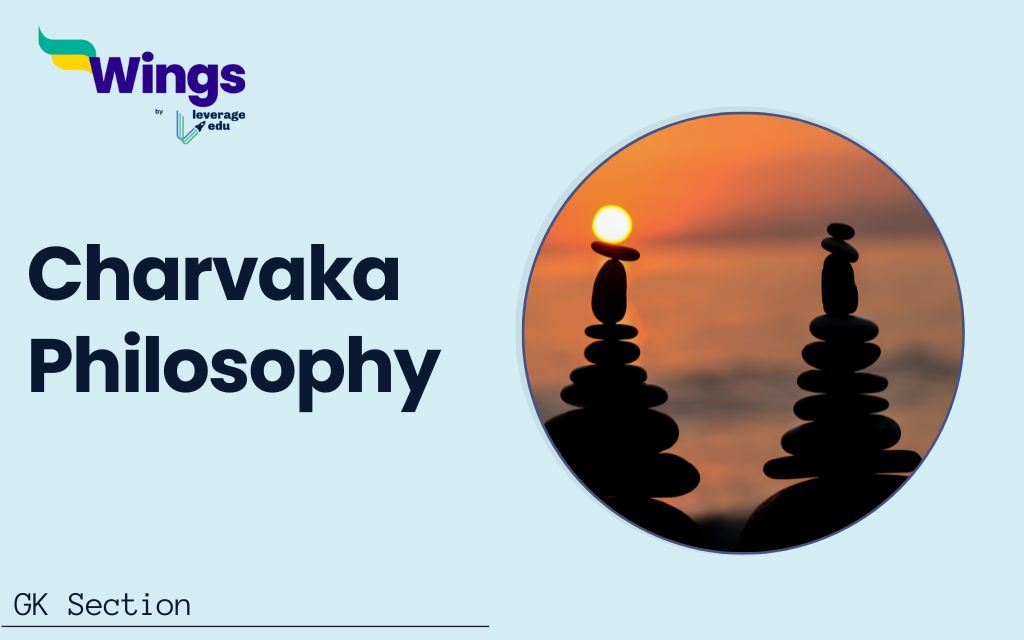Charvaka is an ancient Indian philosophy that emphasises materialism as a way of life. This school of thought opposes all supernatural claims and religious rituals. In this section, we will look into the concept of Charvaka Philosophy to provide a more comprehensive understanding for students preparing for competitive exams.
Contents
What is Charvaka Philosophy?
Charvaka Philosophy, commonly known as Lokayata, dates back to the seventh century BCE. This philosophy is regarded as the oldest philosophy to have existed in ancient India. It stands notable in Indian history for its rejection of established religious ideas. This philosophy adopts a materialist view of life and existence.

History of Charvaka Philosophy
The origin of Charvaka Philosophy is unknown, although it is associated with the name of Sage Brihaspati. This ideology acquired popularity during a time when Vedic knowledge and Brahman tradition ruled society. This way of thinking stands out because it rejects all religious traditions and practices. It emerged as a voice against Vedas and religious practices.
Also Read: Aristotle’s 3 Types of Knowledge and Its Relevance Today
Core Principles of Charvaka Philosophy
The Charvaka Philosophy follows certain principles which are mentioned below:
Materialism
Materialism is the fundamental principle of this Philosophy.
- It states that all elements of the universe are composed of materials such as earth, fire, water, and air.
- According to Charvaka philosophers, consciousness is formed by the union of all of these elements and ceases to exist upon death.
Rejection of Supernaturalism
Charvaka’s philosophy rejects any kind of supernatural thought and ritual.
- Compared to other philosophies, Charvaka does not believe in the concept of a permanent soul (atma) or the cycle of reincarnation (samsara).
- Charvaka’s philosophy strongly opposes such metaphysical beings.
- It highlights the belief that there is no afterlife, karma, or the existence of God.
Empiricism
Charvaka focuses on observation as the only means to acquire knowledge.
- According to this philosophy, pratyaksha, also known as empirical observation, will allow one to receive knowledge in an appropriate and correct manner.
- It rejects the idea of inference, testimony, and comparison as valid sources of gaining knowledge.
Hedonism
Hedonism means the pleasure of all goals.
- This ideology emphasises hedonism, sometimes known as Kama, as the primary goal of life.
- According to Charvaka philosophers, pleasure and the avoidance of pain should guide human behaviour.
- It emphasises happiness, sensory pleasure, and wealth as the ultimate goals of life.
Critique of Religion
Charvaka philosophy is known for his thought of rejection of all Brhamical rituals.
- It challenges the authority of the Vedas and all customary rituals.
- It argues that the rituals are futile since there is no evidence of divine energy on the other end.
Also Read: Vedic Period: A Sacred Chapter of Indian History

Criticism and Influence
Charvaka Philosophy was criticised by various ancient Indian scholars. In particular, traditional Hindu and Buddhist traditions viewed this ideology as unethical and intellectually shallow. This philosophy ignores metaphysical inquiry and ethical standards that extend beyond pleasure-seeking.
Despite its decline in popularity, the charvaka philosophy continues to serve as a challenge to other schools of thought that follow ceremonial practices. Charvaka has made a lasting mark on Indian philosophical discourse. This contributed to numerous arguments about ethics, traditions, and the nature of reality, encouraging deeper thinking on the validity of religious ideas.
Contemporary Relevance
Charvaka philosophy is still studied today due to its emphasis on empirical evidence. It stresses modern atheism and materialism over religious beliefs. Scholars in India enjoy this idea as well, as it highlights the diversity of intellectual currents that contributed to Indian civilization.
In conclusion, Charvaka philosophy is an important chapter in the history of Indian schools of thinking. It promotes materialistic thinking and the pursuit of pleasure as the fundamental goal of life. Its stark denial of divine power and ritualistic ceremonies calls against a traditional understanding that is still relevant today.
Related Posts
| Types of Vedas and Their Significance | Life & Accomplishments of Aurangzeb |
| All the Names of India Throughout History | Gandhara and Mathura School of Art |
| Types of Vedas: Important Features & Details | Religious Studies: Courses and Universities |
| Best Gurukul in India | Buddhist Education System |
FAQs
Charvaka Philosophy, commonly known as Lokayata, dates back to the seventh century BCE. This philosophy is regarded as the oldest philosophy to have existed in ancient India. It stands important in Indian history for its rejection of established religious ideas. This philosophy adopts a materialistic perspective on life and existence.
The origin of Charvaka Philosophy is unknown, although it is associated with the name of Sage Brihaspati. Brihaspati believed that absolute truth isn’t truth at all. He denied any spiritual beliefs and believed perception to be the only true form of knowledge.
Charvaka’s theory of consciousness states that all elements of the universe are composed of materials such as earth, fire, water, and air. According to Charvaka philosophers, consciousness is formed by the union of all of these elements and ceases to exist upon death.
This was all about the “Charvaka Philosophy”. For more such informative blogs, check out our UPSCExams Section and Study Material Section, or you can learn more about us by visiting our Indian exams page.


 One app for all your study abroad needs
One app for all your study abroad needs












 60,000+ students trusted us with their dreams. Take the first step today!
60,000+ students trusted us with their dreams. Take the first step today!